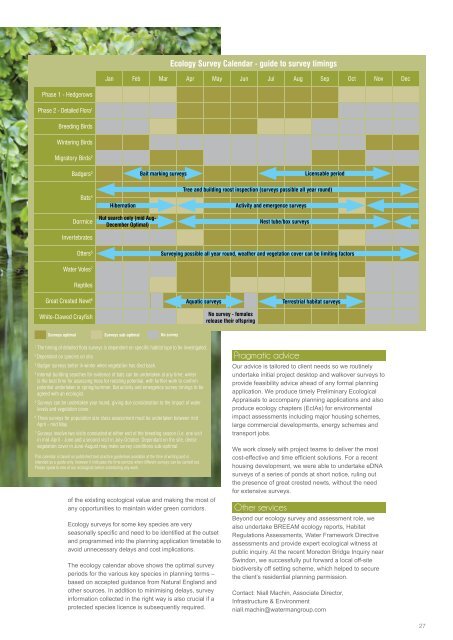waterman
1LedYcD
1LedYcD
Create successful ePaper yourself
Turn your PDF publications into a flip-book with our unique Google optimized e-Paper software.
Ecology Survey Calendar - guide to survey timings<br />
Jan Feb Mar Apr May Jun Jul Aug Sep Oct Nov Dec<br />
Phase 1 - Hedgerows<br />
Phase 2 - Detailed Flora 1<br />
Breeding Birds<br />
Wintering Birds<br />
Migratory Birds 2<br />
Badgers 3<br />
Bait marking surveys<br />
Licensable period<br />
Bats 4<br />
Dormice<br />
Invertebrates<br />
Hibernation<br />
Nut search only (mid Aug-<br />
December Optimal)<br />
Tree and building roost inspection (surveys possible all year round)<br />
Activity and emergence surveys<br />
Nest tube/box surveys<br />
Otters 5<br />
Surveying possible all year round, weather and vegetation cover can be limiting factors<br />
Water Voles 7<br />
Reptiles<br />
Great Crested Newt 6<br />
White-Clawed Crayfish<br />
Aquatic surveys<br />
No survey - females<br />
release their offspring<br />
Terrestrial habitat surveys<br />
Surveys optimal Surveys sub-optimal No survey<br />
1<br />
The timing of detailed flora surveys is dependent on specific habitat type to be investigated.<br />
2<br />
Dependant on species on site.<br />
3<br />
Badger surveys better in winter when vegetation has died back.<br />
4<br />
Internal building searches for evidence of bats can be undertaken at any time; winter<br />
is the best time for assessing trees for roosting potential, with further work to confirm<br />
potential undertaken in spring/summer. Bat activity and emergence survey timings to be<br />
agreed with an ecologist.<br />
5<br />
Surveys can be undertaken year round, giving due consideration to the impact of water<br />
levels and vegetation cover.<br />
6<br />
Three surveys for population size class assessment must be undertaken between mid<br />
April - mid May.<br />
7<br />
Surveys involve two visits conducted at either end of the breeding season (i.e. one visit<br />
in mid-April - June and a second visit in July-October. Dependant on the site, dense<br />
vegetation cover in June-August may make survey conditions sub-optimal.<br />
This calendar is based on published best practice guidelines available at the time of writing and is<br />
intended as a guide only, however it indicates the time periods when different surveys can be carried out.<br />
Please speak to one of our ecologists before scheduling any work.<br />
of the existing ecological value and making the most of<br />
any opportunities to maintain wider green corridors.<br />
Ecology surveys for some key species are very<br />
seasonally specific and need to be identified at the outset<br />
and programmed into the planning application timetable to<br />
avoid unnecessary delays and cost implications.<br />
The ecology calendar above shows the optimal survey<br />
periods for the various key species in planning terms –<br />
based on accepted guidance from Natural England and<br />
other sources. In addition to minimising delays, survey<br />
information collected in the right way is also crucial if a<br />
protected species licence is subsequently required.<br />
Pragmatic advice<br />
Our advice is tailored to client needs so we routinely<br />
undertake initial project desktop and walkover surveys to<br />
provide feasibility advice ahead of any formal planning<br />
application. We produce timely Preliminary Ecological<br />
Appraisals to accompany planning applications and also<br />
produce ecology chapters (EcIAs) for environmental<br />
impact assessments including major housing schemes,<br />
large commercial developments, energy schemes and<br />
transport jobs.<br />
We work closely with project teams to deliver the most<br />
cost-effective and time efficient solutions. For a recent<br />
housing development, we were able to undertake eDNA<br />
surveys of a series of ponds at short notice, ruling out<br />
the presence of great crested newts, without the need<br />
for extensive surveys.<br />
Other services<br />
Beyond our ecology survey and assessment role, we<br />
also undertake BREEAM ecology reports, Habitat<br />
Regulations Assessments, Water Framework Directive<br />
assessments and provide expert ecological witness at<br />
public inquiry. At the recent Moredon Bridge Inquiry near<br />
Swindon, we successfully put forward a local off-site<br />
biodiversity off setting scheme, which helped to secure<br />
the client’s residential planning permission.<br />
Contact: Niall Machin, Associate Director,<br />
Infrastructure & Environment<br />
niall.machin@<strong>waterman</strong>group.com<br />
27


